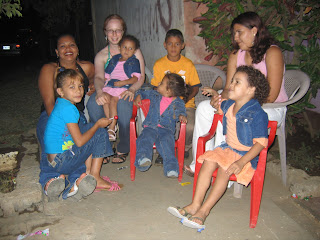While things are generally really good here, I feel like I’m entering another stage of my time here. At first everything is great. Meeting new people who are interested in meeting you, learning about their lives, the community, the new job. You see problems, but you also idealize the good things. Then at some point, the differences and problems grow. Despite the warmth and welcoming that everyone has given me here, which definitely continues, the novelties have worn off, both ways. The differences between us, that we come from radically different backgrounds and life experiences, grow. There ceases to be new things to talk about.
One of the problems that have superseded others is the phenomenon of gossip, both in the community and in the office. Usually the biggest topic of conversation is other people, what they’ve done, what their kids have done, and whatever their particular judgement of the situation is. I’ve found myself getting involved in the gossip circle too, as my life is sometimes the topic of discussion, and people sometimes have judgements of my life and actions. Also, since these are the main topics of conversation, in order to be friends with people and bond with them, this is what you talk about. So trying to integrate into the community and make friends, I’ve started gossiping about other people too. Although nothing bad has come of this so far, I’m making a pact not to do this anymore, because I don’t want to become involved in the disputes and alliances within different sectors of the community or in the office.
The other is the kids in my house, particularly the youngest. I love them to death (seriously, I do!), but they can be really crazy sometimes! Itzia throws temper tantrums all the time over nothing. She’s really demanding that people give her what she wants immediately, and I think the fact that she usually gets the things she wants when she screams and cries makes her continue to do it. Sometimes Leddys, the 4 year old, will lose control and just start hitting you or climbing all over you if she’s angry about something. When we went to the mall one day, we were in the food court, and Leddys got angry about the kind of drink we ordered so she sat in the middle of the floor yelling and took her shoes off. Meanwhile, Itzia was throwing a tantrum because she couldn’t go on any more rides.
The other problem that just came up yesterday is Karen’s disappearance. She was taken in by one of the staff (W) here when her mother abandoned her. I think she was about 9 when taken in, and now she’s 14. The staff person has taken care of all of her basic needs and helped her throughout her adolescence. However, from what I’ve seen, it seems like it’s obvious that she’s not treated like her other kids. W orders her around, makes her fill up the barrels of water, cook, wash the clothes, etc, then criticizes what she’s done, saying the soup is bad, you did this wrong, or too slow, cut the onions too small, don’t take care of your clothes, etc. When her other daughter, the same age, isn’t expected to do anything around the house. Karen has to stay home and take care of the house when everyone else is out. But I’ve never seen her yell back or complain. Recently, W has been complaining about how she has to follow Karen around to make sure she doesn’t sleep with any boys, that there’s tons who she’s going out with and she’s really promiscuous. I have no idea whether she has boyfriends or not, but to have your mom criticize you and basically call you a whore must hurt.
W arrived at Doña Esmeralda’s house crying yesterday because Karen hadn’t come home. She had supposedly left to give some shoes to a friend of W’s at around 5 and never returned. She didn’t take anything with her. All last night she was worried and waiting for Karen to call, but she never did. They don’t know whether she went of her own will or just disappeared. This morning I went by the house to see what happened, if she’d called during the night. I just pictured the kid wandering the streets, or kidnapped, or dead by the side of the road. It’s not safe out there, with gangs and violence and predators. So when I arrived, T said that she didn’t want Karen back. If she was so ungrateful to leave without a trace, she wasn’t welcome anymore. She made her decision, now she has to deal with the consequences. I was just sad, almost to tears, at her jumping to conclusions and lack of worry over the other possibilities… that she could be hurt, or in danger. Poor kid. I just really hope she’s alright or that there could have been some intervention beforehand to prevent this...














